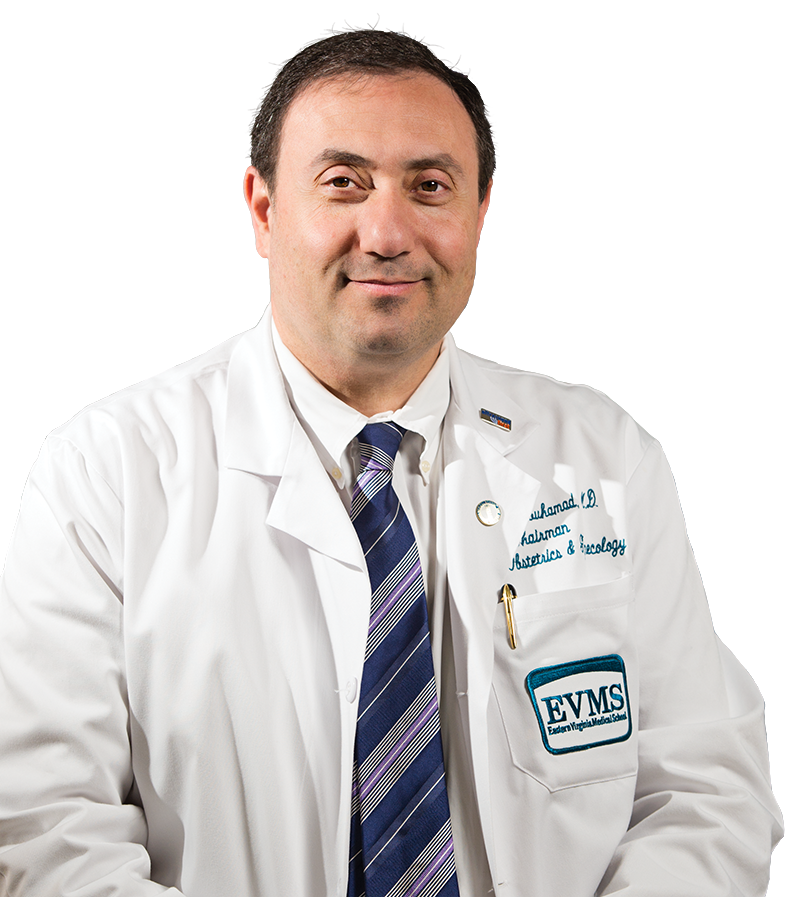behind The Bench
OB-GYN Chair sees research as “labor of love”
Alfred Abuhamad, MD, had just completed his training in 1992 when he heard about an opening at EVMS.
“I came on a Friday and I fell in love with the place,” Dr. Abuhamad recalls. “I called back on Monday and said ‘I want the job.’”
Dr. Abuhamad’s rare combination of knowledge and abilities could have landed him a job nearly anywhere. His decision to come to EVMS was fortuitous not only for him and the institution but for mothers everywhere.
Over the last quarter century, he has earned an international reputation for his work in ultrasound, prenatal diagnosis, global outreach and patient safety. He now holds the Mason C. Andrews Chair in Obstetrics and Gynecology and is Vice Dean for Clinical Affairs and Professor and Chair of Obstetrics and Gynecology. He is a leader in his profession and the author of two textbooks, which have been translated into seven languages. He has brought ultrasound education to remote villages in Haiti and led a multi-society task force to standardize ultrasound teaching for OB-GYN residents.
With all these responsibilities, somehow he still finds time to conduct research.
His research interest began during his residency and evolved over the years to focus on prenatal diagnosis, ultrasound and now — thanks to a $2.7 million grant from the National Institutes of Health — the human placenta.
“There is evidence today that shows that the human placenta has an impact on us and on diseases that happen years later in our lives.”
“Traditionally we have not studied the placenta to any extent that really allows us to understand how it works and how it impacts the development of the baby,” he says. “There is evidence today that shows that the human placenta has an impact on us and on diseases that happen years later in our lives.
The placenta plays a major role in who we are, Dr. Abuhamad says.
“The placenta is the organ for providing oxygen to the baby. It’s the organ that protects the baby from a lot of infections or external stimuli. It’s also the organ that provides a lot of information to the baby and to the mother about the progress of pregnancy.
“Pregnancy has a beautiful outcome more than 90 percent of the time,” he says. But when there are problems, the risks can be serious for mother and child.
His research is following 550 women to see if there is evidence within the placenta that a pregnancy will become problematic. That evidence could be the basis of a test pregnant women could take in the first trimester.
“In the not-so-distant future,” he says, “we are hoping there will be some intervention we can do — maybe some medicine or some changes in activities — that would really provide significant improvement to those high-risk pregnancies.”
Dr. Abuhamad often works nights and weekends to keep apace of his research and other responsibilities.
“I love what I do, so it is a labor of love,” he says. “I wouldn’t do it any other way.”
Dr. Alfred Abuhamad’s Accomplishments

- Chairman of the Ob Right Program, a nationally recognized program in patient safety and quality
- Serves on the board of the Society of Ultrasound in Medical Education, International Society of Ultrasound in Obstetrics and Gynecology, Maternal Fetal Medicine Foundation and Society of Maternal-Fetal Medicine
- A past President of the American Institute of Ultrasound in Medicine
- Named one of 13 recipients of the 33rd annual Outstanding Faculty Award by the State Council of Higher Education for Virginia
- Awarded the Joseph H. Holmes Clinical Pioneer Award by the American Institute for Ultrasound in Medicine in recognition of his career achievements in education, patient care and research